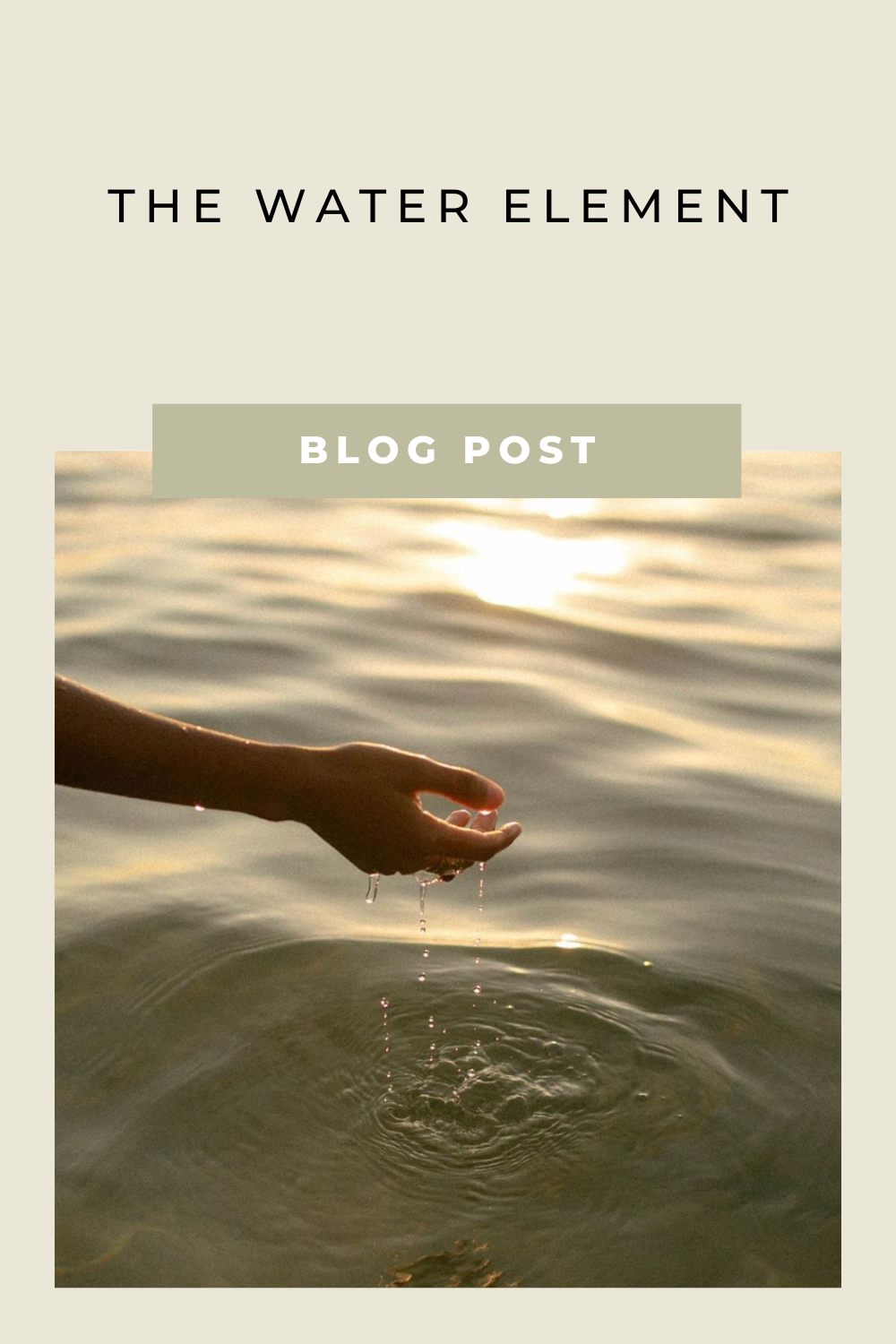The Water Element - Understanding Our Physical and Psychological Depths
In Traditional Chinese Medicine (TCM), the five elements - Wood, Fire, Earth, Metal, and Water - represent fundamental energetic patterns that govern both our physical health and psychological landscape. Among these, the Water element holds a particularly profound place, embodying the deepest aspects of our psyche and serving as the foundation for all elements.
The Essence of Water: Foundation and Flow
Water represents the most primal and essential aspect of life force, known as Jing (精) or Essence in Chinese medicine. Just as water nourishes all life on Earth, the Water element in our bodies provides the fundamental energy that sustains our entire being. It governs the Kidney and Bladder organs, but its influence extends far beyond these organs into the very core of who we are.
The Water element embodies qualities of depth, wisdom, and adaptability. Like water itself, this element teaches us about flowing around obstacles, finding the path of least resistance, and yet possessing the power to carve through mountains over time. When we understand the Water element within ourselves, we begin to grasp the profound connection between our deepest fears, our greatest wisdom, and our capacity for profound transformation.
The Psychology of Water: Fear, Wisdom, and Will
The Emotion of Fear
In TCM's emotional framework, fear is the emotion associated with the Water element. However, this isn't simply about being afraid, it's about understanding fear as a fundamental survival mechanism and messenger. When the Water element is balanced, fear serves its proper function - alerting us to genuine dangers and helping us make wise decisions about self-preservation.
Imbalanced Water energy can manifest as chronic anxiety, phobias, or conversely, reckless behavior that ignores legitimate risks. People with Water imbalances might experience deep-seated fears about survival, security, or their basic worth. They may feel overwhelmed by life's challenges or, alternatively, become so fearful that they avoid taking any risks at all.
The Gift of Wisdom
The Water element is considered the seat of wisdom in TCM. This isn't merely intellectual knowledge but rather the deep, intuitive understanding that comes from life experience and inner reflection. Water energy connects us to our ancestral wisdom and the collective knowledge stored in our bones, marrow and Jing.
Those with strong Water energy often possess an almost mystical understanding of life's deeper patterns. They can see through superficial appearances to underlying truths and often serve as counselors or guides for others navigating difficult periods. This wisdom comes from Water's association with the Kidneys, which in TCM store both our individual Essence and the wisdom passed down through our genetic lineage.
Will and Determination
The Water element governs Zhi (志), often translated as willpower or determination. This isn't the aggressive, forceful will of the Fire element, but rather the steady, persistent determination of water wearing away stone. It's the quiet strength that allows us to persevere through long, dark winters of the soul.
When Water energy is strong, we possess an unshakeable core that can weather any storm. We have the capacity for long-term determination and the patience to see difficult projects through to completion. This willpower is intimately connected to our survival instinct and our deepest sense of purpose.
Seasonal Rhythms and Psychological Patterns
Water corresponds to winter, the season of introspection, conservation, and deep rest. Just as nature preserves energy into roots and seeds during winter, the Water element calls us to turn inward, to conserve our energy, and to connect with our deepest resources.
Psychologically, winter Water energy invites us into periods of reflection and inner work. This is the time for processing the experiences of the year, for deep meditation or therapy, and for connecting with our most fundamental values and desires. People who are out of sync with their Water energy often struggle during winter months, experiencing seasonal depression or a sense of disconnection from their inner life.
The Water element teaches us that periods of apparent inactivity are actually times of profound inner work. Like seeds germinating in the dark soil, our psyche uses these quiet periods to integrate experiences and prepare for new growth.
Recognising Signs of Water Imbalance
Physical Signs
Chronic fatigue or burnout
Lower back pain or weakness
Kidney or bladder issues
Premature aging or graying
Hearing problems
Bone and joint issues
Emotional and Mental Signs
Chronic anxiety or fearfulness
Lack of willpower or motivation
Difficulty with long-term planning
Feeling disconnected from one's life purpose
Either excessive risk-taking or extreme risk aversion
Memory problems or difficulty learning from experience
Behavioral Patterns
Procrastination or inability to complete projects
Workaholism or inability to rest
Difficulty setting boundaries
Problems with authority or feeling powerless
Isolation or excessive dependence on others
Nurturing Your Water Element: Practical Approaches
Lifestyle Practices
Rest and Restoration: Honour your need for adequate sleep and regular periods of solitude. The Water element requires more rest than other elements to maintain harmony.
Mindful Movement: Gentle, flowing exercises like tai chi, qigong, or swimming particularly nourish Water energy. These practices help cultivate the fluid, adaptable quality of water.
Meditation and Inner Work: Regular meditation, journaling, or therapy supports the Water element's need for introspection and wisdom cultivation.
Dietary Support
Foods that support the Water element tend to be warming, nourishing, and often dark in color:
Black beans, black sesame seeds, and other dark foods
Warming spices like ginger and cinnamon
Bone broths and other deeply nourishing foods
Seafood (particularly from saltwater) and seaweed
Adequate salt intake (but not excessive)
Foods rich in minerals and trace elements
Adequate hydration, preferably filtered or spring water
Environmental Considerations
Creating spaces that support Water energy involves incorporating elements of rest, darkness, and quietude:
Ensuring your bedroom is dark and quiet for restorative sleep
Spending time near natural water sources when possible
Creating quiet spaces for reflection and meditation
Minimising overstimulation from electronics, especially in the evening
The Water Element and Modern Psychology
The Water element's wisdom aligns well with modern psychological understanding of trauma, resilience, and personal growth. The concept of Jing or Essence parallels what psychologists might call our core sense of self or fundamental life energy. When this essence is depleted - through chronic stress, trauma, or overwork - we experience symptoms that Western medicine might diagnose as depression, anxiety, or chronic fatigue.
The Water element's emphasis on facing fear with wisdom rather than avoidance resonates with therapeutic approaches that encourage us to develop a healthier relationship with difficult emotions. Rather than trying to eliminate fear entirely, Water wisdom teaches us to listen to fear's message while not being controlled by it.
Integrating Water Wisdom Into Modern Life
In our fast-paced, achievement-oriented culture, the Water element's lessons are particularly relevant. We live in a society that often values the Yang qualities of action, productivity, and external achievement while neglecting the Yin qualities of rest, reflection, and inner development that Water represents.
Learning to honour the Water element means:
Recognising that rest is not laziness but essential restoration
Understanding that periods of low energy or motivation might be calls to turn inward rather than push harder
Developing comfort with uncertainty and change
Trusting in the slow, patient process of deep transformation
Valuing wisdom and experience as much as youth and innovation
The Gift of Water: Depth and Authenticity
Ultimately, the Water element offers us the gift of authenticity and depth. When we connect with our Water energy, we access not just our individual wisdom but the deeper currents of human experience that connect us all. We learn to trust the slow process of inner development and to find strength in our ability to adapt and flow with life's changes.
The Water element reminds us that true power often looks like yielding, that profound wisdom comes from facing our deepest fears, and that our greatest strength lies not in rigid resistance but in flexible resilience. In a world that often values surface appearance over depth, the Water element calls us back to what is most essential and true within ourselves.
By understanding and nurturing our Water element, we cultivate not just better health but a more profound connection to our authentic self and our place in the larger flow of existence. This is perhaps the greatest gift of Water wisdom: the recognition that we are both drops in the ocean and the ocean in a drop, individual and universal, fleeting and eternal.
If you think you may have a Water Element imbalance or if you have any other questions about the information above, you are always welcome to email me directly or fill out the contact form on my website to get in touch.
Veronika Peovska
(BHSc Acupuncture)
“To be skilled at nurturing one’s nature and wellbeing is to treat disease before it arises.” - SUN SIMIAO














